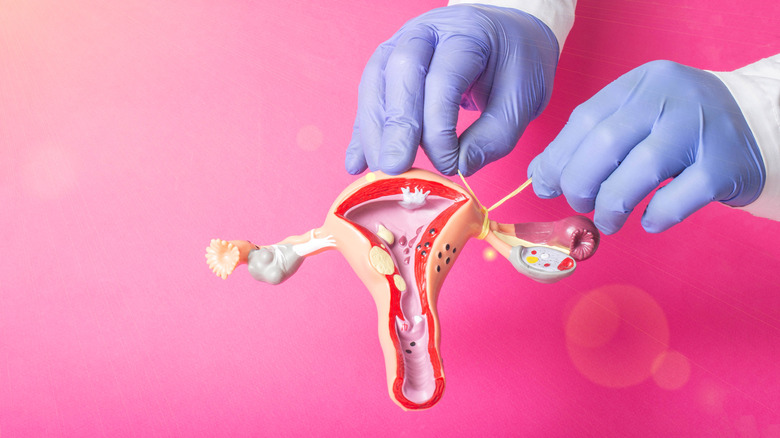Questions You Should Be Asking Your Gynecologist
For some of us, visiting the gynecologist can be an anxiety-inducing experience. Not only do we have to expose ourselves to a virtual stranger, but the sheer lack of discussion about various female conditions in mainstream conversation always makes us wonder, "Am I normal?" Thankfully, most gynecologists are comfortable answering the questions that we can perceive as the most embarrassing.
Sometimes though, just figuring out which questions to ask can be a daunting experience in itself. From wondering about the regularity of your menstrual cycle to simple anatomical questions to concerns regarding fertility, there are quite a few questions that you should be asking your gynecologist annually (via Bustle). Of course, many of these important questions vary based upon which life stage you are in. But some things need to be discussed no matter what, regardless of how mortifying the thought of broaching the topic is. When it comes to asking your gynecologist ultra-personal questions, your best bet is to summon the courage to advocate for yourself and ask away. Remember, you probably aren't the only one who will ask them about vaginal discharge today.
How heavy or light should my menstrual flow be?
Menstruation may not be your favorite topic to discuss with your doctor. Still, the ability to ask the right questions about your cycle can provide your gyno with valuable insight as to the inner workings of your body. Every woman's cycle is different. Thus, the amount of menstrual blood relinquished by the body each month varies from woman to woman (via Mayo Clinic). As with many medical questions, the range of what is considered normal exists on a spectrum.
You may have short, light periods, and your best friend might have longer-lasting, heavier periods, and that is okay! Different types of birth control can also influence the heaviness or frequency of your periods. Overall, it is up to you to talk to your provider about what is normal for YOUR body given your age, family history, and more. One valuable tool that you can employ is to track your menstrual cycle. You can keep tabs on the length of your cycle, the heaviness of your flow, and any random aches, pains, or symptoms that accompany it. Armed with this knowledge, you can present the facts to your doctor to help determine what is normal for your body.
Should I worry about irregular periods?
In general, most women's periods last four to seven days and arrive somewhere between every 21 to 35 days (via Cleveland Clinic). You will likely know immediately when something is off if you track your periods. Even if you don't track them, you will be the first to know if something strange is going on within your body, obviously. In many cases, irregular periods are a cause for concern, which is why this is an important question to ask your doctor.
Irregular and abnormal periods can present in many different ways. Still, some of the most common aberrations are missed periods, exceptionally short or long timeframes between menses, changes in flow volume, extra long periods of bleeding, or periods that include pain, cramping, nausea, and vomiting. These occurrences are worth speaking with your doctor about, as some can signal underlying health issues. Of course, sometimes irregular periods happen because of stress, birth control changes, or rapid weight fluctuations. Some of the more insidious underlying conditions that irregular periods can signify are endometriosis, uterine polyps, cervical cancer, and more. Though it might seem uncomfortable to broach this topic, if you are experiencing irregular periods, it is important to ask your doctor about them.
How do I know if I have an STI?
There is a huge stigma surrounding sexually transmitted infections (STIs), making asking your gynecologist about the signs and symptoms feel incredibly fraught and uncomfortable. If left untreated, an existing STI can leave you susceptible to contracting other STIs more readily, or lead to complications that can spiral into cancer and even death (via Mayo Clinic). This is why it is so important to find the courage to ask your doctor how to know if you have an STI.
The scariest part about STIs is that some do not cause any symptoms. While many can lead to unusual discharge, odor, painful urination, and many other telling symptoms, some are asymptomatic. While your doctor can educate you about many of the tell-tale signs of STIs, the only way to truly know whether you've contracted one is to get tested. Once you ignite this conversation with your doctor, you two can together determine the frequency in which you should get tested for sexually transmitted infections.
How often should I get tested for STIs?
As STI's are an incredibly difficult and stigmatized topic to discuss, it is super important to ask your doctor how often YOU should be getting tested. The answer to this question fully depends on your situation, lifestyle, and history. Based upon the guidelines set forth by the Centers for Disease Control and Prevention (CDC), all people between the ages of 13 and 64 should be tested for HIV at least once. If they have engaged in unsafe sex or shared injection drug equipment, testing should be done annually. Pregnant women should run through a battery of tests early on in their pregnancy to ensure the health of a baby.
Aside from that, the guidelines vary based on your age, your number of partners, and the types of sexual activities you're engaging in (for instance, some STIs can be contracted orally). Some tests are recommended annually to those who see a gynecologist. Being honest about your sexual activities with your doctor or a trained clinician is the best way to truly determine how often you should get tested for STIs.
Can I reduce my risk of developing breast cancer?
Breast cancer is unfortunately common, and in the U.S. is the most common non-skin-related cancer diagnosed in women (via American Cancer Society). Many of us know people who have been affected, and for those of us lucky to skirt around this illness thus far, we'd love to know if it is possible to reduce our risk. The likelihood of breast cancer increases after a woman goes through menopause, but that doesn't mean we can't start looking out for our post-menopausal futures now (via American Cancer Society). The best way to determine your risk is to have a transparent conversation with your doctor.
While this is an incredibly important topic to discuss with your doctor, there are a few ways that you can decrease your risk of developing breast cancer before you even set foot into your gyno's office. Maintaining a healthy weight, especially after menopause, is one aspect that lends itself to a healthy future. Beyond that, staying active, eating healthfully, avoiding alcohol, and only using hormone replacement therapy (HRT) under the care of a physician can also help mitigate some of the risks of developing breast cancer.
What tests should I get this year?
The world of gynecology and feminine-specific care is huge — it is huge to the point that many of us aren't even sure what to ask our doctors when we do make it in for our annual visits. It is important to ask your doctor what you should be tested for each year because, of course, this varies based on a ton of different lifestyle (and age!) factors (via Tufts Medical Center). Typically, your OBGYN will do a pelvic exam, which consists of palpating the pelvic region. Then they will do a breast exam to ensure that there are no rogue lumps or bumps that need further investing. After that, they may collect a urine sample to test for pregnancy or STIs and then perform a pap smear. A pap smear is the swab test that gynos do to check for cancerous or pre-cancerous cells on the cervix.
Once your doctor has performed these tests, you can discuss what other tests might be necessary for you this year. If you have a family history of breast cancer, your doctor might suggest a mammogram for you. If you have pre-cancerous cells that need biopsied, your doctor will likely prescribe further testing. No matter your family history, it is super important to chat with your doctor about what specific tests should be run for you at a given time. Once your doctor has a full picture of who you are as a person, they can guide you toward testing that could aid in the early detection or prevention of other illnesses in your future.
Can I increase my fertility?
Seeing a gynecologist regularly is important, even if you are in a committed and monogamous relationship. Deciding that you are ready to expand your family only to be met by Aunt Flo month after month can be disheartening. It can feel incredibly personal, especially if your calendar is full of gender reveal parties and baby showers. Your fertility, and ways to potentially increase your chances of getting pregnant, are absolutely topics worth discussing with your gynecologist (via Healthline).
Barring no unforeseen situations, a 30-year old woman has a 20% chance of getting pregnant with each menstrual cycle. This is to say, it does not always happen as readily as we might hope for or imagine. Your doctor might initially guide you toward ensuring you are a healthy weight, on a healthy diet, and not using any lubricants that can detract from the vitality of your partner's sperm. They may also recommend tracking your ovulation, taking your basal temperature, and tracking your cervical mucous. While these lifestyle changes might not spell automatic success for you and your future family, they are good places to start. Only you and your doctor can truly determine how to up your individual chances of becoming pregnant.
What are my contraception options?
If you are not yet ready to consider having children, contraception is a huge conversation topic that should be discussed at length with your gyno (via CDC). Not all forms of birth control are created equal, and not all will fit into your unique lifestyle and physiology. As with every question we ask our doctors, we need to provide as much truthful information as possible to find the best options. Your birth control options might vary widely based on availably, safety, effectiveness, accessibility, affordability, and acceptability within your community.
Based on the type of sexual encounters you prefer, your doctor may recommend multiple types of contraception at once. For example, IUDs are great for preventing pregnancy but do next to nothing when it comes to protecting you from STIs. From intrauterine devices to condoms to birth control pills to monthly shots, the options are seemingly endless for contraception. By being upfront and honest with your doctor, you can together decide which type of contraception fits into your life in the best way possible. Just be sure to ask your doctor to run through all of the options and educate you before haphazardly prescribing the most popular choice.
How much daily discharge is normal?
Honestly, this actually feels like one of the cringiest questions to ask your gyno-saur. In fact, discussing vaginal discharge is one of the most taboo topics of conversation that come to mind — talking about poop feels easier than this! The glands of the vagina and cervix produce mucous as a way of shedding old cells and keeping themselves clean (via Monistat). That is to say, vaginal discharge is completely normal, though the amount does vary from woman to woman. Furthermore, where you are in your menstrual cycle can play a role in the amount and type of discharge you are experiencing. The discharge is usually milky or white in a healthy reproductive system, and devoid of any foul odors.
There are some signs in your discharge that might signal a deeper health condition. If you have a sudden change in the amount, odor, or consistency of your discharge, it is definitely worth discussing with your doctor. Sometimes unusual discharge can signify a yeast infection, STI, or other genital-related issues.
Why is my libido low?
Sex is something that many women discuss with girlfriends, of course. But it is not something that many of us love to talk about in a clinical setting when a physician with a clipboard is sitting across from us taking notes about everything we say. It can be especially difficult to discuss sexual dysfunction and low libido with your doctor, but if you are struggling with a lack of sex drive, your doctor might be able to help (via Mayo Clinic). In women, many of the fluctuations that we feel in our libidos can directly result from events going on in our lives — things like mental health, lifestyle choices, and hormonal changes during different life stages can all contribute. Often, certain medications can interfere as well. Since a low sex drive can be caused by many factors, it is important to give your doctor a clear picture of your life. No matter the reason, if a low libido is affecting your life, don't be shy when it comes to talking about this with your doctor.
How do I know if the smell is normal?
Up there on the awkwardness scale with discussing the quality and amount of vaginal discharge is asking your doctor about your vaginal odor. We get it; it's uncomfortable to talk about. But checking in with your doctor regarding your vaginal odor can help keep you healthy; it can also help you identify if an underlying condition is wreaking havoc on your insides.
While your healthy odor is unique to your body, it can fluctuate with your menstrual cycle, workout routine, and the type of underwear and pants you are wearing (via Healthline). The acidity of your vagina can change on an hourly basis, and with it can come a fluctuation in odors. A tangy, earthy, or sweet smell is often considered very normal. Fishy, unpleasant, pungent, chemical, or rotting odors are abnormal. They should be discussed with a professional sooner than later to ensure that nothing too nefarious is going on beneath your belt.
Why is sex painful?
Painful sex is way more common than you might guess (via Healthline). In fact, your gyno likely has many other patients who come in asking the very same question — "Why does sex hurt so much?" And there's no reason to settle for painful sex without a reasonable answer. Unfortunately, as many as three out of every four women experience painful sex at some point in their lives. Painful sex can be caused by a dozen or more different reasons, varying in severity and length of time that is average to be endured.
Summoning the courage to ask your doctor why sex is painful for you may help determine how they can help increase your quality of life. Some of the more benign culprits of painful sex include vaginal dryness, fatigue, stress surrounding your job or finances, or allergic reactions to soaps. On the far end of the spectrum, painful sex could be an indication that you are suffering from vaginismus, vaginitis, ovarian cysts, or other complications that need prompt attention from your doctor.
What is the best way to stay clean down there?
Usually you can find an entire section full of potions alleged to keep the female sex organs clean in grocery and drug stores. If you are unsure of the proper protocol, it is advised to check with your gynecologist. However, a few basics can help you set the scene for ultimate vaginal cleanliness without all of the artificially scented elixirs that are more likely to cause pH imbalances than anything else.
Physiologically speaking, the actual vagina is internal and does not need to be washed (via Healthline). The outer portion, the vulva, is what requires washing. The best substance is to use to wash your vulva is warm water. Experts say a bit of mild, non-irritating soap is fine if you want to use it, but that is not necessary. These same experts unanimously state that all of the floral-scented washes available for purchase are preying on the insecurities we may have surrounding our natural bodily odors. They can irritate the vulva and the vagina, so it is best to steer clear of these products. In fact, it is best to avoid all scented products, as they all have the potential to disrupt the fragile balance of your vagina's pH.
Am I healthy?
"Am I healthy?" may seem like a pretty nebulous question to ask your healthcare provider. Still, the entire point of visiting their office is to ensure that you are healthy. While your gyno is mostly assessing your reproductive health, they should be looking at you holistically (via Everlywell). That is to say, they should be checking in to make sure that your mental health is not suffering, nor any other part of your body/life.
By asking your doctor this overarching question, you should be able to leave their office with a greater sense of comfort in the health of your body. Having confirmation that everything is looking a-okay is a great way to put stray anxieties at ease. If this question seems too vague, it might help to write a list of miscellaneous questions before visiting your doctor's office. That way, you won't forget about all of the niggling questions you may have about your health.















